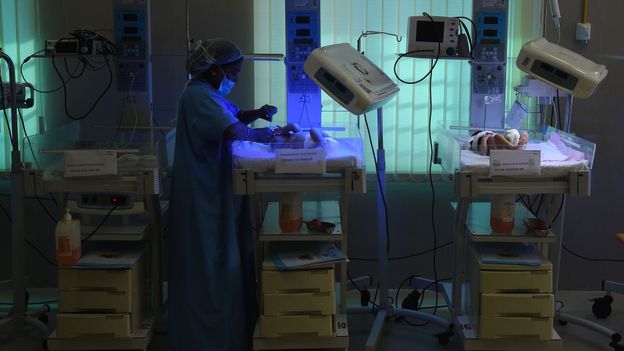
This helped – until he contracted another round of sepsis, caused by a bug called Serratia marcesens, a common source of neonatal infections.
Around the world, an estimated 15% to 24% of all neonatal deaths are due to sepsis.The incidence of neonatal sepsis is an estimated 1.8 times higher in middle-income countries and 3.5-fold higher in low-income countries, compared with wealthier nations. South Asia has one of the highest burdens of this devastating condition: 39% of all global neonatal sepsis deaths occur in this region.
Now a new enemy is making newborn sepsis even more dangerous: so-called superbugs, bacteria that have become resistant to antibiotics.Such antimicrobial resistance, known as AMR, can leave doctors helpless in the face of raging infections.
"We've seen that growing antimicrobial resistance in developing countries is making the problem of neonatal sepsis much worse," says Mohammed Shahidullah, a professor of neonatology at Bangabandhu Sheikh Mujib Medical University in Bangladesh."Neonatal sepsis is now one of the major causes of hospital admissions and deaths in Bangladesh.
That's why when infants are infected with sepsis in a hospital setting, the bacteria responsible are far more likely to be resistant to the available drugs than when they contract an infection after returning to their homes, says Shahidullah.
"The biggest challenge in dealing with sepsis in infants is to know which organism is causing the infection — it's not always possible to isolate in some cases, or to even determine whether they have an infection," says Sally Ellis, project leader of the children's antibiotics programme at GARDP.A separate study found that globally in 2019, nearly 140,000 newborn deaths were caused by bacterial antimicrobial resistance.GARDP and its partners analysed 3,200 cases of newborn babies with clinically diagnosed sepsis in an effort to better understand the impact of antibiotics resistance.The focus was on finding out which antibiotics are used to treat newborns with sepsis, and to what extent drug-resistance rendered these treatments ineffective.
"This is alarming and foretells the impending crisis of a lack of antibiotics to treat sepsis caused by multidrug-resistant organisms," the researchers said in their report.In India, around 20% of the country's one million neonatal deaths a year are caused by sepsis, according to data from the US and India-based public health research orgnaisation, the Center for Disease Dynamics, Economics and & Policy (CDDEP).Of these, 58,000 deaths are a direct result of antimicrobial resistance.
"For the 25 million babies born in India every year, nearly the size of the population of Australia, we've had only 64 studies on neonatal sepsis from Jan 2000 to August 2018," says Sankar.They also highlight that poverty and unequal access to healthcare make babies more vulnerable to contracting sepsis in the first place, a situation worsened by "spiraling antimicrobial resistance".
That can mean a more complex causal chain, like antimicrobial resistance leading to neonatal deaths from sepsis, "is ignored", he says.
In wealthier countries, a high number of neonatal sepsis is caused by bacteria that are classified as "Gram-positive" – organisms that give a positive result in a test known as the Gram stain test which is used to classify bacteria – says Sankar.A wide range of different microbes also appear to be responsible for these Gram-negative sepsis infections, and they tend to show high rates of antimicrobial resistance – between 50–70%.
"That's why low-and -middle income countries are seeing a greater mortality from neonatal sepsis than developed nations," he says.Instead, doctors in poorer countries have to figure out which microbe caused the sepsis, hope it shows up in the available tests, and then see if it's even treatable with their antibiotics.In Nepal, neonatal sepsis was found to be higher among babies born to mothers who did not attend antenatal check-ups, again highlighting the importance of support for prospective parents
"For more widespread change, we need to consider antimicrobial resistance as a socio-political challenge and not just a medical one," says Abdul Ghafur, a consultant in infectious diseases at the Apollo Cancer Institute in the Southern Indian city of Chennai"Proper sanitation at home, in healthcare institutions and in communities is key to dealing with neonatal sepsis aggravated by [antimicrobial resistance] and to prevent re-infection in children."
New antibiotics and vaccines can be developed for bacteria that are now resistant to existing antibiotics," he says